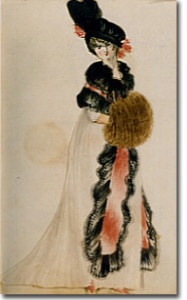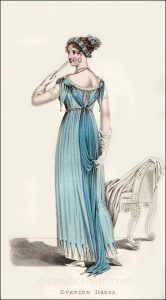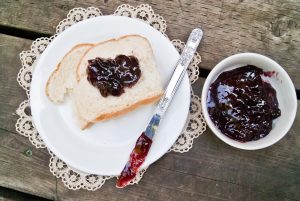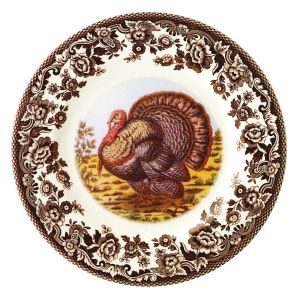Jane Austen wrote very little about Christmas directly, though we may remember such fictional moments as the “fine family piece” of a Christmas scene in Persuasion, with little girls cutting up silver paper and little boys reveling over plates of brawn and cold pies, and Lady Russell being annoyed by the noise. Or Mr. Elton delighting in the snowy “Christmas weather” as he prepared to make his ill-conceived proposal to Emma.
If we examine the letters Jane Austen wrote in the month of December, although there are still no direct descriptions of Christmas festivities, we can still get some idea of how she spent the season. Only a handful of her December letters survive, and may be conveniently divided into Early, written in 1798-1800, when she was in her twenties and living at Steventon; Middle, from 1808, when she was in her early thirties, after her father had passed away and she was living in Southampton; and Later, the December letters which date from 1815 and 1816. These were written from London and Chawton, shortly before her decline and death at 41. Most of the series of letters were written to her sister Cassandra who was making her frequent visits to Godmersham.
I’ve assembled just a few quotes from these “December letters,” all relating to the winter, the weather, and her activities. Thus we gather glimpses of her Decembers in three different seasons of her life…
Early letters
Letter #14, December 18 1798, from Steventon, to Cassandra at Godmersham.
“I enjoyed the hard black Frosts of last week very much, & one day while they lasted walked the whole way to Deane by myself.- I do not know that I ever did such a thing in my life before.” [Deane House, where Jane met Tom Lefroy, is about two miles from Steventon.]

Deane House
“We dine now at half after Three, & have done dinner I suppose before you begin. – We drink tea at half after six. – I am afraid you will despise us. – My father reads Cowper to us in the evening, to which I listen when I can. How do you spend your Evenings? – I guess that Eliz:th works, that you read to her, & that Edward goes to sleep.”
[Black frost, or a dry freeze, occurs when the temperature drops to freezing point, but the air does not contain enough moisture to form white frost on exposed surfaces. This causes an internal freezing of the vegetation, leaving it with a blackened appearance and killing it.]

A black frost
Letter #15 December 24 – 26 1798, from Steventon, to Cassandra at Godmersham
“I returned from Manydown this morning, & found my Mother certainly in no respects worse than I left her.- She does not like the cold Weather, but that we cannot help.”
“Our Ball was very thin, but by no means unpleasant. There were 31 People and only 11 Ladies out of the number, & but five single women in the room…There were twenty Dances & I danced them all, & without any fatigue. – I was glad to find myself capable of dancing so much & with so much satisfaction as I did; – from my slender enjoyment of the Ashford balls (as Assemblies for dancing) I had not thought myself equal to it, but in cold weather & with few couples I fancy I could just as well dance for a week together as for half an hour. – My black Cap was openly admired by Mrs. Lefroy, & secretly I imagine by every body else in the room.”

[The detail of her black Cap seems to me rather unusual. In 1798, Jane had just turned twenty-three, and usually it was matrons who wore caps, not young marriageable women. We do know that younger members of the family considered that she and Cassandra had adopted the wearing of caps unnecessarily soon. A cap, especially a black one, also seems odd attire for a dance, and it is quite difficult to find an illustration of a black cap at that period. In fact, the only one I found was the very stylish black hat that Jane Austen herself wore in the portrait James Stanier Clarke made, supposedly of her, when she visited at Carlton House in 1815. Her costume is for street wear, not dancing, but the hat is black!]
Letter #28 December 1, 1800, from Ibthorpe, to Cassandra at Godmersham
“It is too dirty even for such desperate Walkers as Martha & I to get out of doors, & we are therefore confined to each other’s society from morning till night, with very little variety of Books or Gowns.”
“Martha has promised to return with me, & our plan is to have a nice black frost for walking to Whitchurch, & there throw ourselves into a postchaise, one upon the other, our heads hanging out at one door, & our feet at the opposite.”
Middle letters
The next set of letters written in December are from 1808, fully ten years later; Jane is now thirty-three, and her tone seems less girlish, though she still retains her vivid observations of balls and fashion.
Letter #62, December 9, 1808, from Castle Square, to Cassandra at Godmersham.
“Yes – I mean to go to as many Balls as possible, that I may have a good bargain. Every body is very much concerned at our going away, & every body is acquainted with Chawton & speaks of it as a remarkably pretty village, & every body knows the House we describe – but nobody fixes on the right.”
“Our Ball was rather more amusing than I expected, Martha liked it very much, & I did not gape till the last quarter of an hour. – It was past nine before we were sent for, & not twelve when we returned. – The room was tolerably full, & there were perhaps thirty couple of Dancers; – the melancholy part was to see so many dozen young Women standing by without partners, & each of them with two ugly naked shoulders! – It was the same room in which we danced 15 years ago! – I thought it all over- & in spite of the shame of being so much older, felt with thankfulness that I was quite as happy now as then.”

Evening dress with “naked shoulders”
“You will not expect to hear that I was asked to dance – but I was – by the Gentleman whom we met that Sunday with Capt. D’auvergne. We have always kept up a Bowing acquaintance since, & being pleased with his black eyes, I spoke to him at the Ball, which brought on me this Civility; but I do not know his name, – & he seems so little at home in the English Language that I believe his black eyes may be the best of him.”
“I am glad you are to have Henry with you again; with him & the Boys, you cannot but have a cheerful, & at times even a merry Christmas.”
#63 December 28 1808, from Castle Square, to Cassandra at Godmersham
“Our Eveng party on Thursday produced nothing more remarkable than Miss Murden’s coming too, tho’ she had declined it absolutely in the morng, & sitting very ungracious & very silent with us from 7 o’clock, till half after 11 – for so late was it, oweing to the Chairmen, before we got rid of them. The last hour, spent in yawning & shivering in a wide circle round the fire, was dull enough – but the Tray had admirable success. The Widgeon, & the preserved Ginger were as delicious, as one could wish. But as to our Black Butter, do not decoy anybody to Southampton by such a lure, for it is all gone. The first pot was opened when Frank & Mary were here, & proved not at all what it ought to be; – it was neither solid, nor entirely sweet – & on seeing it, Eliza remembered that Miss Austen had said she did not think it had been boiled enough. – It was made you know when we were absent. Such being the event of the first pot, I wd not save the second, & we therefore ate it in unpretending privacy; & tho’ not what it ought to be, part of it was very good.”
[A traditional delicacy originating in the Channel Isles, hence also known on the Hampshire coast. Apple puree, with sugar, lemons, liquorice and allspice added, is boiled for hours until reduced to a thick, black, almost solid mass, in which state it is put into jars. It can be eaten either as a sweetmeat or a condiment.]

[What, exactly, is a Widgeon? A species of dabbling duck.]
“We have had Snow on the Ground here almost a week, it is now going, but Southampton must boast no longer.”
Late letters
Letter #129, from Hans Place, London, December 2, 1815, to Cassandra at Chawton
“We shall be delighted to see Edward on Monday – only sorry that you must be losing him. A Turkey will be equally welcome with himself. – He must prepare for his own proper bedchamber here, as Henry moved down to the one below last week; he found the other cold. – I am sorry my Mother has been suffering, & am afraid this exquisite weather is too good to agree with her. – I enjoy it all over me, from top to toe, from right to left, Longitudinally, Perpendicularly, Diagonally; – & I cannot but selfishly hope we are to have it last till Christmas; – nice, unwholesome, Unseasonable, relaxing, close, muggy weather!”
- December 17 1816. To James Edward Austen at Steventon, from Chawton.
“Ben [Lefroy] was here on Saturday, to ask Uncle Charles & me to dine with them, as tomorrow, but I was forced to decline it, the walk is beyond my strength (though I am otherwise very well) & this is not a Season for Donkey Carriages; & as we do not like to spare Uncle Charles, he has declined it too. – Tuesday. – Ah! Ha! -Mr. Edward, I doubt your seeing Uncle Henry at Steventon today. The weather will prevent your expecting him I think. – Tell your Father, with Aunt Cass:’s Love & mine, that the Pickled Cucumbers are extremely good…”
Undated in December 1816.
“My dear Anna,
Your Grandmama is very much obliged to you for the Turkey, but cannot help grieving that you should not keep it for yourselves. Such Highmindedness is almost more than she can bear. – She will be very glad of better weather that she may see you again & so we shall all.”

Decembers in Jane Austen’s life seem to be somewhat circumscribed by weather, but visiting, dances, and traveling still took place, and she wrote, as at all seasons, about the “little matters” of daily life, what was worn, what food there was, who she saw and what she thought of them. The images of Hampshire under frosts black and white, fires inside and the special treat of a turkey or widgeon, are all related with her own inimitable wry spirit, that seems to take us there, nearly two and a quarter centuries ago…

18 comments
Skip to comment form
“& there throw ourselves into a postchaise, one upon the other, our heads hanging out at one door, & our feet at the opposite.””
What a fun. Thank you for the post. I found the recept of “Apple puree, with sugar, lemons, liquorice and allspice added” very interesting. Do you know where to find a good recept to try?
Have a nice day. You made mine.
Simone, I’m so glad you enjoyed the post! Thanks for commenting. Yes, I did find a recipe for black butter, at the site where I got the picture that I used. This is it:
http://kitchenhistoric.blogspot.com/2012/06/black-butter-1839.html?m=1
That recipe looks like a modern version, but I’m sure there are more!
All best,
Diana
Thank you for the answer. I found a recipe here: https://www.jersey.com/guides-features/jersey-black-butter
I will try with a smaller amount of apples. 🙂
Simone
My goodness, Simone, they certainly made large amounts of the stuff back then, didn’t they! If you do make black butter, I’d love to hear how it came out and what you thought of it. Happy holidays!
I’m struck by how quietly truthful they are, no exaggerations, no pretenses of happiness. I’ve written a couple of different blogs drawing from the letters and novels on Christmas (anything that mentions the holiday somehow or other and there are quite a number in the novels) but I have never thought just to find utterances also just about the weather or events mentioned as connected with December, and cold and outfits. Hard frost might also refer to assumptions about roads and hunting: no hunting in a hard frost, but it could be easier to walk; on the other, carriages might overturn more easily ….
Ellen – Yes, it’s interesting, isn’t it, how much the letters reveal and continue revealing, in details just looked at or searched for in a slightly different way. You get just a little different perspective, or details – and it’s never less than rewarding! I felt I’d made a delicious discovery when I realized that in Decembers she’d written about black frost, black cap, and black butter!
Diana,
I enjoyed reading this. I liked the photograph of the black butter, which I had imagined as apple butter, but it seems something else, especially with the licorice added! I would like to try it sometime.
On a list I belong to, which have discussing how difficult it was to regulate heat in the 19th century home, so I appreciated Austen’s comment on the group “shivering” around the fire. I am remembering back to our lovely group read of the letters …
Something went wrong: On a list I belong to, we have been discussing how difficult it was to regulate heat in the 19th century home …
Hi Diane, yes, I saw that lovely thread on the Laura Ingalls Wilder list on keeping 19th century homes warm! It gave me a lot of food for thought and comfort reading too. It’s funny how we enjoy the same things!
I like to imagine one Christmas that Austen alluded to in “Pride and Prejudice”: Lizzy’s first Christmas at Pemberley. Toward the end of the book, when she writes to Mrs. Gardiner to announce her engagement, she writes ” You are all to come to Pemberley at Christmas.” I can just picture the Gardiner children exploring Pemberley, the festivities, perhaps even a visit from Father Christmas himself!
Anne-Marie, that is exactly the kind of detail that shows what Austen did that makes it so compelling to try to imagine “how things went” further! She gives us a little example like that – and off our imaginations go, picturing the scenes that are just slightly suggested. And that is why so many people are moved to write sequels and continuations, don’t you think?
It’s too bad the last P&P movie (with Keira Knightley) didn’t end with a brief flash forward to that first Christmas with all the Gardiner children. I think I would have liked it much better than the ending they tacked on!
Anne-Marie, you could not be more right! In fact, I would even venture to say that if Jane Austen herself had finished P & P with a Christmas at Pemberley scene, we’d have loved it. She did give us the suggestion, though, to make us start imagining it!
Ah, but I’d say if you look at P&P for any references to Christmas, you find but one and it is hypocritical: Caroline Bingley’s cruel letter to Jane ends: “I sincerely hope your Christmas in Hertfordshire may abound in the gaieties which that season generally brings.” That’s her suggestion to us in P&P. Emma is the first novel where she has a Christmas that resembles the modern 20th century on American one: families visit, there is a dinner party, but if you look at Christmas eve, day, &c you find Emma is glad to be able to go nowhere after the disaster in the coach returning from the Westons. Persuasion is the first where we begin to have a “feeling” like the American Christmas but look at the words, and they are again sceptical and part of an idea that different people like different things, and Anne Elliot is not keen on noise. The problem with followups, sequels is we lose Austen. It is true quite a number of the movies make an effort to transport the modern Christmas into the Austen stories but there is little textual justification — except Emma.
Of course, Ellen, their Christmas was not our Christmas – even less so at the beginning of Austen’s writing career than at the end. Even with the few quotes and snippets about the season in her books and letters, we can get a sense of the more circumscribed and lower key way things were in their winters. And of course we inevitably lose Austen in sequels because they are not hers: but we ourselves can learn so much about her, her world, and her ideas, by trying to extend her suggestions.
The thing is she is so satiric, so ironic, and we can find at best spare descriptions of weather and irony over parties. I went over to an old blog where I had tried the sort of thing you’ve done and found pretty much the same quotations – a few more:
https://reveriesunderthesignofausten.wordpress.com/2017/12/23/christmas-in-jane-austens-lettersandnovelsonceagain/
It’s wrong to call her anti-Christmas — she wouldn’t know what we are talking about. But there is so little suggestive of what we see say in the Emma movies — also Bridget Jones makes heavy work of Christmas. In the blog I quote Southey who wrote a rare poem with feelings we assume today — wishing he were home for Christmas &c.
She does allow us to expand emotionally (Tomalin actually says she doesn’t allow this very much at all in the letters) but not about this group sort of thing.
Ellen, yes, we have both written and thought on this theme over the years, in Decembers of our own; I usually do such a post as part of my regular blog contributions, and find it one of the most interesting things to do. Whenever or however one scrutinizes the letters, either in a big way as we did with our big project, or in smaller excursions such as this, one never comes away without finding or observing something new, however small. As for how Christmas is treated in the Austen movies, that is neither more or less pertinent than saying that you lose Austen in the sequels. Exactly so with the movies…yet people enjoy both, either as readers, viewers, or (especially!) as creators: and there is always something to be learned.
Yes every Christmas or Winter Solstice, and Austen’s texts don’t change. We may but these don’t — they are the same suggestive yet intransigent texts year after year.